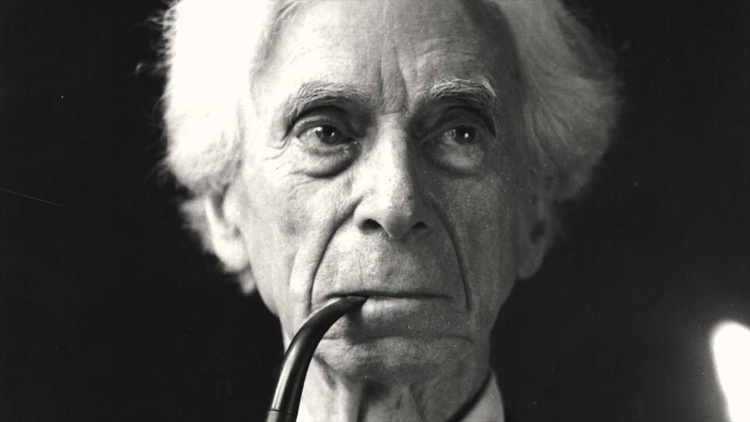Long before there were Richard Dawkins, Christopher Hitchens and Sam Harris, there was Bertrand Russell. In my book Heaven, I said that Bertrand Russell has been called the greatest mind of the twentieth century. Anticipating his death he said, “There is darkness without, and when I die there will be darkness within. There is no splendor, no vastness anywhere; only triviality for a moment, and then nothing.”
The apostle Paul was one of the greatest minds of the first century. He said, in contrast to Russell's words, “I desire to depart and be with Christ, which is better by far” (Philippians 1:21).
In researching If God is Good, I came across a fascinating 1948 debate on BBC Radio, in which Russell discussed with Father Frederick Copleston the naturalistic versus the Christian basis for believing in good and evil.
At one point Russell said, “I feel that some things are good and that other things are bad. I love the things that are good, that I think are good, and I hate the things that I think are bad. I don’t say that these things are good because they participate in the Divine goodness.”
Copleston asked him, “So you distinguish good and bad by what faculty?” Russell responded, “By my feelings.”
Copleston pointed out that Hitler—his atrocities fresh in everyone’s mind—did what felt good to him. He pressed Russell on whether he believed in any such thing as moral obligation. Russell answered, “I’m inclined to think that ‘ought,’ the feeling that one has about ‘ought,’ is an echo of what has been told one by one’s parents or one’s nurses.... I think the sense of ‘ought’ is the effect of somebody’s imagined disapproval; it may be God’s imagined disapproval, but it’s somebody’s imagined disapproval. And I think that is what is meant by ‘ought.’”
Russell gave his opinion about the sense of human moral obligation, but he posed no objective basis for actual moral obligation. He ended the debate by saying, “I cannot attribute a Divine origin to this sense of moral obligation, which I think is quite easily accounted for in... other ways."
If a subjective sense of happiness or well-being constitutes a moral system, then Charles Manson, terrorists, and genocidal dictators have an equally authoritative moral ground when they appeal to their own personal preferences. Of course we all know they are wrong—but how do we know? The Christian worldview affirms that God’s character provides the objective standard that determines good and evil: “Be holy because I, the LORD your God, am holy” (Leviticus 19:2).
Here's a more detailed exchange from part of their debate, recorded in Bertrand Russell on God and Religion, edited by Al Seckel (Prometheus Books).
R: You see, I feel that some things are good and that other things are bad. I love the things that are good, that I think are good, and I hate the things that I think are bad. I don’t say that these things are good because they participate in the Divine goodness.
C: Yes, but what’s your justification for distinguishing between good and bad or how do you view the distinction between them?
R: I don’t have any justification any more than I have when I distinguish between blue and yellow. What is my justification for distinguishing between blue and yellow? I can see they are different.
C: Well, that is an excellent justification, I agree. You distinguish blue and yellow by seeing them, so you distinguish good and bad by what faculty?
R: By my feelings.
C: By your feelings. Well, that’s what I was asking. You think that good and evil have reference simply to feeling?
R: Well, why does one type of object look yellow and another look blue? I can more or less give an answer to that thanks to the physicists, and as to why I think one sort of thing good and another evil, probably there is an answer of the same sort, but it hasn’t been gone into in the same way and I couldn’t give it [to] you.
C: Well, let’s take the behavior of the Commandant of Belsen. That appears to you as undesirable and evil and to me too. To Adolf Hitler we suppose it appeared as something good and desirable, I suppose you’d have to admit that for Hitler it was good and for you it is evil.
R: No, I shouldn’t quite go so far as that. I mean, I think people can make mistakes in that as they can in other things. if you have jaundice you see things yellow that are not yellow. You’re making a mistake.
C: Yes, one can make mistakes, but can you make a mistake if it’s simply a question of reference to a feeling or emotion? Surely Hitler would be the only possible judge of what appealed to his emotions.
R: It would be quite right to say that it appealed to his emotions, but you can say various things about that among others, that if that sort of thing makes that sort of appeal to Hitler’s emotions, then Hitler makes quite a different appeal to my emotions.
C: Granted. But there’s no objective criterion outside feeling then for condemning the conduct of the Commandant of Belsen, in your view?
R: No more than there is for the color-blind person who’s in exactly the same state. Why do we intellectually condemn the color-blind man? Isn’t it because he’s in the minority?
C: Well, do you accept any moral obligation?
R: Well, I should have to answer at considerable length to answer that. Practically speaking — yes. Theoretically speaking I should have to define moral obligation rather carefully.
C: Well, do you think that the word “ought” simply has an emotional connotation?
R: No, I don’t think that, because you see, as I was saying a moment ago, one has to take account of the effects, and I think right conduct is that which would probably produce the greatest possible balance in intrinsic value of all the acts possible in the circumstances, and you’ve got to take account of the probable effects of your action in considering what is right.
C: Well, I brought in moral obligation because I think that one can approach the question of God’s existence in that way. The vast majority of the human race will make, and always have made, some distinction between right and wrong. The vast majority I think has some consciousness of an obligation in the moral sphere. It’s my opinion that the perception of values and the consciousness of moral law and obligation are best explained through the hypothesis of a transcendent ground of value and of an author of the moral law. I do mean by “author of the moral law” an arbitrary author of the moral law. I think, in fact, that those modern atheists who have argued in a converse way “there is no God; therefore, there are no absolute values and no absolute law,” are quite logical.
R: I don’t like the word “absolute.” I don’t think there is anything absolute whatever. The moral law, for example, is always changing. At one period in the development of the human race, almost everybody thought cannibalism was a duty.






